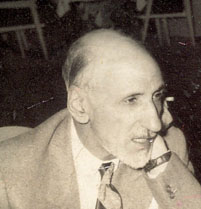
Ali Dashti
(1898-1981 or '82)Ali Dashti is by all means an enigmatic figure in the pantheon of Iranian literary and political personalities that captured the public attention for a better part of the twentieth century. His career, in fact, stretched from the early 1920s to the time of his death in 1982 in the course of which he rose from plebeian to patrician and occupied all stations in between. Part of the fascination with Dashti’s public persona is due to his passionate defense of national dignity and social justice. The idea of a compact between the state and citizens, a guaranty of permanence for the former and security and welfare for the latter, remained a constant in Dashti’s political writing throughout his life. This is not by any means to say that Dashti was the only member of the Iranian intelligentsia to voice such ideas. Rather, he is unique in the fact that he proclaims his opinions with more vigor and directness than most. As such, Dashti may rightly be credited with inaugurating journalistic prose—a style of writing that self-consciously coalesces an ideological stance with independently verifiable facts—in the arena of Iranian political discourse. Dashti’s political activism resulted in arrests and incarcerations, and, surprisingly, a seat in the parliament. It must be understood that throughout the rule of the Pahlavi dynasty, except for brief interims following the Allied invasion of Iran in 1941 and during Mohammad Mossadegh’s tenure as premier (28 April 1951–19 August 1953), membership in the parliament was hardly elective. No individual could sit in either chamber of the parliament without the tacit approval of the royal court. As such, Dashti’s membership, representing a district he had never lived in, points up the fact that by this time his standing as a literary figure—fiction writer and literary critic—overshadowed his past as a dissident intellectual, and a seat in the upper house of the parliament was in recognition of that standing.
Acknowledgements
Ali Dashti: His Life and Work
By Sayeh Dashti
Chapter 1
Speaking of Sa‘di
Chapter 2.
Angularity vs. Curvature
Chapter 3.
Sa‘di's Innovations
Chapter 4.
Sa‘di and the Others
Chapter 5.
Khaghani and Sa‘di
Chapter 6.
Anvari and Sa‘di
Chapter 7.
Sana’i and Sa‘di
Chapter 8.
Nasser-e Khosrow and Sa‘di
Chapter 9.
The Ballads of Sa‘di: Jamal ud Din
Ebn-e Abdul Razzagh and Sa‘di
Chapter 10.
Sa‘di's Contemporaries
Chapter 11.
The Golestan
Chapter 12.
The Bustan
Chapter 13.
The Luster of Sa‘di’s Ethos
Chapter 14.
Master of the Ghazal
Chapter 15.
Sa‘di’s Ideas and Beliefs
Afterword
By Faridoun Farrokh